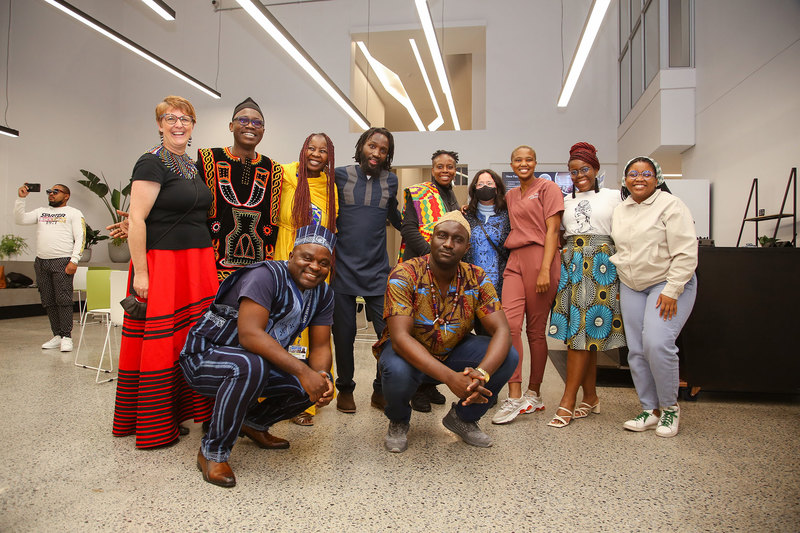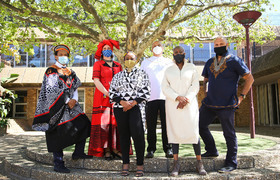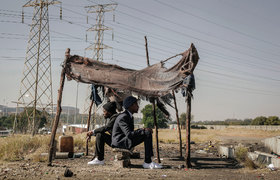Harnessing healthcare to build the ‘Africa We Want’
23 May 2022 | Story Nicole Forrest. Photo Je’nine May. Read time 7 min.
On 16 May, ahead of Africa Day 2022, the University of Cape Town’s (UCT) Faculty of Health Sciences (FHS) hosted a celebration with the theme “The Future of Healthcare in Africa”. The hybrid event featured talks from key figures from Africa’s healthcare sector as well as live performances from some of the continent’s most popular acts.
Presented online as well as in the Neuroscience Institute Auditorium, the event was facilitated by the UCT FHS in collaboration with the Pan-African Health Sciences Forum, the Institute of Infectious Disease and Molecular Medicine (IDM), Neuroscience Institute and the Global Surgery Division.
Africa Day, which takes place on 25 May, was instituted with the aim of providing a day on which to celebrate the cultural identity and common heritage of continental Africans. In line with this, according to the head of Global Surgery, Associate Professor Salome Maswime, the FHS’s aim was to reflect on the current state and future of healthcare in Africa, highlighting some of the successes and challenges we face “as optimists who are committed to building our continent”.
A sense of collective solidarity
The dean of the FHS, Associate Professor Lionel Green-Thompson, emphasised the significance of Africa Day both for the faculty and the continent in general. “Africa Day is becoming increasingly a part of the fabric of who we are as a faculty and continues to call us back to the recognition that all of us, as continental Africans, are continuing to make significant contributions to who and what we have become,” he said.
“If we do not recognise that if all of Africa is not healthy, we are not healthy ourselves.”
Associate Professor Green-Thompson went on to highlight the need for developmental regionalism and a sense of collective solidarity on the African continent, as set forth in the African Union’s (AU) Agenda 2063: The Africa We Want. He noted that these outcomes could be achieved through focusing on four pillars: fair trade; cooperation on transformative industrialisation; cooperation on cross-border infrastructure investment; and cooperation of democracy, governance, peace and security.
“I use those four pillars as reference for us in the health sector because in many ways, those four ideas permeate the way we engage in the health sector. If we do not recognise that if all of Africa is not healthy, we are not healthy ourselves.
“Today,” he added, “we celebrate the convergence of a significant history, and sometimes romantic nostalgia, that we gather. Today as we celebrate these times and as we look to the future, we begin to see we need to fulfil our promises and commitments to building a better Africa.”
Collaborating for success
Using Africa’s response to the COVID-19 pandemic as the backdrop for his assessment of the healthcare sector’s potential, the director of the Africa Centres for Disease Control and Prevention, Dr John Nkengasong, focused on how African nations can pool their resources to address the ongoing challenges of emerging infectious diseases, endemic diseases and non-communicable diseases.
“One week after the first cases were discovered on the continent, the AU convened an emergency meeting. We discussed the need to ensure a joint effort that spoke to four Cs: cooperation, collaboration, coordination and communication. That helped us to set up a continental strategy,” he noted.
This synchronicity, Dr Nkengasong said, ensured that political leaders as well as healthcare institutions and workers were able to devise a programme for and respond to the pandemic in a way that was most appropriate for the African continent.
“We must contextualise policies to ensure that they can be implemented in Africa.”
“We established the five Ps for an effective pandemic response. First, we needed to know the pathogen to enable the development of diagnostics, vaccines and therapeutics. Then we needed to know your population; which public health measures will work for them, which won’t.
“The third P is that local policies matter. We must contextualise policies to ensure that they can be implemented in Africa. Linked to this is politics, the fourth P. We must take our destiny into our own hands to avoid falling behind,” he said.
“Finally, we must focus on partnerships. Having appropriate action-oriented partnerships is essential. This requires us to look inwards for investment, partnering with one another and with actors in the private sector who have a vested interest in the continent.”
Using this five-pronged pandemic response in combination with a collaborative approach, Nkengasong believes that Africa can begin to secure healthcare stability. “We really would like to build a movement across these five action items that characterises a new public health order to guarantee the health security stability of the continent,” he concluded.
A holistic approach to healthcare
Professor Agnes Binagwaho, the vice-chancellor of the University of Global Health Equity, focused on the cycle of positive outcomes that can be driven by improving healthcare. “The future of healthcare is important because we need to break the vicious cycle of poverty and disease by promoting the virtuous cycle of health and wellness.
“Improvement in health outcomes increases productivity, which contributes to economic growth, which, in turn, leads to better health. Understanding this, it is clear that we need to invest in the health system,” she said. This investment, according to Professor Bingawaho, is essential if we are to accelerate economic and social transformation, as envisioned by Agenda 2063.
Among the myriad challenges faced by the healthcare sector in Africa, the vice-chancellor noted that a lack of healthcare professionals, the burden of disease and inequity pose some of the greatest threats. However, rather than simple investment, a holistic approach must be followed if we wish to build the “Africa We Want”.
“We need to change laws, strategies, policies, governance and practices for the quality of our health service delivery to improve. For example, we need to revisit skills and knowledge of the health profession on our continent to enable health professionals to contribute more to and manage the health system. We also need to work on task sharing and to maximise the health professional that we had.
“The brain drain costs us US$2 billion per year, so it will be less costly to have good policies for retention and improving salary than it will be to attempt to compensate for the knowledge leaving the continent each year,” she added.
“So, we must also push for more numbers of non-clinical and clinical health professionals, we must improve education, we must attract financial investment and push to strengthen the regulatory capacity of the continent. All of this together will help us to provide better healthcare for our population.”
 This work is licensed under a Creative Commons Attribution-NoDerivatives 4.0 International License.
This work is licensed under a Creative Commons Attribution-NoDerivatives 4.0 International License.
Please view the republishing articles page for more information.










